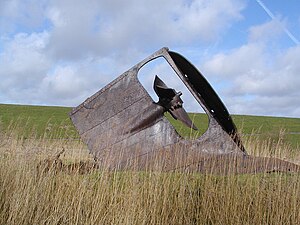Engineering:SS Kaffraria
 The remains of the SS Kaffraria at Otterndorf, Germany
| |
| History | |
|---|---|
| Name: | SS Kaffraria |
| Namesake: | Kaffraria, the name given to the southeast part of the Eastern Cape of South Africa |
| Owner: | W.S. Bailey |
| Ordered: | 1862 |
| Builder: | J Laing Ltd, Sunderland |
| Launched: | 21 April 1864 |
| Maiden voyage: | 1864 |
| Homeport: | Hull, England |
| Identification: | |
| Fate: | Wrecked 7 January 1892 |
| General characteristics | |
| Tonnage: |
|
| Length: | 237 ft (72 m) |
| Beam: | 29 ft (8.8 m) |
| Depth: | 16 ft (4.9 m) |
| Propulsion: |
|
| Speed: | 8–10 knots (15–19 km/h; 9.2–11.5 mph) |
SS Kaffraria was a British cargo ship owned by Bailey & Leetham of Hull, England . She was built in 1864 by J. Laing & Son, Ltd., of Sunderland, England . She was originally built for the shipping company Ryrie & Company of London, which sold her to Bailey & Leetham in 1871.
Construction
Initially the ship was rated at 872 gross register tons, but this was increased in 1873 to 1,039 gross register tons.[1] She was 237 feet (72 m) long and had a beam of 29 feet (8.8 m) with a depth of 16 feet (4.9 m). She was a single-screw schooner constructed of iron, with one deck with two tiers of beams, five cemented bulkheads, a well deck, and a double bottom aft.[1] She had a four-cylinder compound engine which produced 90 horsepower (67 kW). The engine was built by the Humber Iron Works of Hull, England . Her Lloyd′s Register code letters were WFVQ and her official number was 49917.
Wreck
While under the command of Captain W. Barron, Kaffraria ran aground in the River Elbe at Otterndorf, Germany, on 7 January 1891. The ship had a cargo of general export goods such as kitchen utensils, children’s toys, bundles of wool, hand tools, and all kinds of domestic appliances. Local residents quickly removed the cargo both legally and illegally. Later on 8 January, the ship sank. The wreck became a threat to shipping and was removed in 1984. The stern part of the ship with the rudder and screw can be seen today at Otterndorf.
References
- ↑ 1.0 1.1 "ShipsK". Archived from the original on 17 May 2008. https://web.archive.org/web/20080517055910/http://www.reach.net/~sc001198/ShipsK.htm. Retrieved 2017-01-21. transcription from the Lloyd's Register of British and Foreign Shipping.
 |

